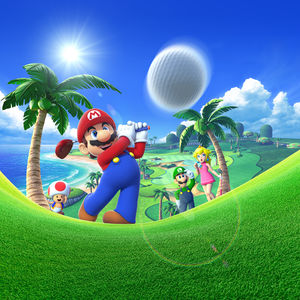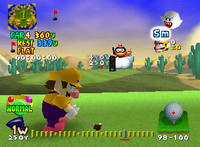Mario Golf (series): Difference between revisions
m (→Predecessors) |
|||
| (344 intermediate revisions by 92 users not shown) | |||
| Line 1: | Line 1: | ||
{{italic title | {{italic title}} | ||
{{series infobox | |||
{{series | |image=[[File:Mario Golf Series Logo.png|280px]]<br>The current logo of the ''Mario Golf'' series | ||
|caption= | |||
|image=[[File:Mario Golf Series Logo.png|280px]] | |first=''[[Golf: Japan Course]]'' ([[List of games by date#1987|1987]]) | ||
|first=''[[Golf]]'' ([[List of | |latest=''[[Mario Golf: Super Rush]]'' ([[List of games by date#2021|2021]]) | ||
|latest=''[[Mario Golf: | |number=9 | ||
|number= | |franchise=''[[Super Mario (franchise)|Super Mario]]'' | ||
| | |||
}} | }} | ||
'''Mario Golf''' is a series of | The '''''Mario Golf''''' series is a video game series primarily developed by [[Camelot Software Planning]] and published by [[Nintendo]]. It stars [[Mario]] and other characters of the [[Super Mario (franchise)|''Super Mario'' franchise]] participating in golfing events. The series was preceded by ''[[Golf]]'', which starred Mario, who was known as Ossan in this game. A variant of this game called ''[[Stroke & Match Golf]]'' released for the [[VS. System]] had two different versions, one starring Mario and the other starring a [[lady golfer]]. The series' namesake [[Nintendo 64]] game, ''[[Mario Golf (Nintendo 64)|Mario Golf]]'', was released in 1999, and it is often misconceived as the first game of the series, especially in the {{iw|wikipedia|Western world}}. Aside from an entirely different [[Mario Golf (Game Boy Color)|handheld counterpart]], releases followed one game for both the [[Nintendo GameCube]] and the [[Game Boy Advance]], while the sixth installment was released for the [[Nintendo 3DS]] in 2014, and a [[Mario Golf: Super Rush|seventh installment]] was released for the [[Nintendo Switch]] in 2021. Some games in the series double as role-playing games, the single-player story modes in particular. | ||
Prior to ''Mario Golf'' were three installments of the main series: ''[[Golf: Japan Course]]'', ''[[Golf: U.S. Course]]'' (both released for the [[Family Computer Disk System]] in Japan only), and ''[[NES Open Tournament Golf]]'', which is titled ''Mario Open Golf'' in Japan, more clearly billing it as a ''Mario Golf'' title there than to English-speaking audiences. | |||
The N64 and Game Boy Color versions can communicate with each other via [[Transfer Pak]] connectivity, and the GameCube and GBA versions can do the same via the Game Link Cable; the connectivity features allow players to upload characters and data from one game into the other. | |||
==Gameplay== | |||
[[File:Mario Golf World TourArtwork.jpg|thumb|300px|Mario hits a golf ball with other characters looking on.]] | |||
In early ''Mario Golf'' games, it is unknown where the golf is taking place. Most games include many clubs to choose from. ''Stroke & Match Golf'' and ''Golf: Japan Course'' included an extra playable lady golfer. | |||
In ''NES Open Tournament Golf'', the holes are located in [[Japan]], the [[United States]], and the [[United Kingdom]], with other locations appearing in the Japanese version. In single-player mode, only Mario is playable, but [[Luigi]] is playable in multiplayer, and other pre-existing ''Super Mario'' characters make smaller appearances. Luigi and several original characters appear as opponents. | |||
In Camelot's ''Mario Golf'' games, players can play as a variety of recurring ''Super Mario'' characters, including Mario, Luigi, [[Princess Peach]], [[Baby Mario]], [[Yoshi]], [[Donkey Kong]], [[Wario]], and [[Bowser]] among others. The first- and second-generation ''Mario Golf'' games also feature original human characters created by Camelot specifically for these games, such as [[Kid]], [[Plum]], [[Sonny (Mario Golf)|Sonny]], and [[Harry (Mario Golf)|Harry]]; none of these characters have made any reappearances outside the series save for Plum, who has appeared as a trophy in ''[[Super Smash Bros. Melee]]'' and as a sticker in ''[[Super Smash Bros. Brawl]]'', and Kid, who has appeared in ''[[Super Smash Bros. Ultimate]]'' as a spirit. | |||
''Mario Golf'' games are typical golf games, where the player's objective is to hit the ball into the hole by using as few strokes as possible. The games in the series specifically have simplified "pick-up-and-play" type gameplay, which does away with many of the complicated real-life aspects of golf as found in other games relating to the sport. However, despite the simplicity of the games' appearance and play style, they run on very deep {{wp|game engine}}s. Before each swing, the player chooses a club, a general direction, and a range for the ball to travel. During the swing, the player determines power by timing a button press for a marker to stop at the desired point on a power meter; at this point, the player can choose to influence the direction of the ball by applying spin. Players can alternate between auto and manual shots, with the latter providing the player with more control, albeit at a higher risk of a poor shot. Many of these gameplay aspects, such as spin, are affected by characters' individual statistics. These relate to features such as control of the ball and the general height of shots, which determines how much the character's play is affected by environmental factors such as wind, rain, and relief of the land. The first- and second-generation ''Mario Golf'' home console games also have characters use recorded voice samples to comment on their opponents' shots. | |||
''Mario Golf'' games contain several gameplay modes and variants of golf, including the traditional stroke and match play, speed golf, ring shot, mini golf, and skins match. The main mode is "Tournament Mode," where the player competes against {{wp|artificial intelligence}} (AI) opponents on a series of courses to win trophies. With the progression of the series, new modes were introduced, such as "Character Match," where characters battle computer-designated AI opponents to be upgraded into "star characters" and gain statistical enhancements; "Coin Attack," where players can collect coins scattered around courses; and "Ring Attack," where players are required to direct the ball through rings of varying locations, angles, and diameter while keeping on or under par. | |||
The courses in ''Mario Golf'' games are based on traditional locations within the ''Super Mario'' franchise, such as the grounds of [[Peach's Castle]] in the [[Mushroom Kingdom]]. As the series progressed, more complex terrain and exotic features were introduced into courses, and courses were designed to resemble real-life golf courses. More advanced courses offer a higher frequency of difficult terrain and elevation, as in bunkers, which limit the accuracy and range of shots. There are also hazards themed after the ''Super Mario'' universe: These include [[lava]] pits, [[Thwomp]]s, [[Chain Chomp]]s, etc., which will incur one-shot penalties if landed on, as will water sections and out-of-bounds areas; and [[Warp Pipe]]s, which can change the location of the ball. | |||
The handheld ''Mario Golf'' games are styled after {{wp|Role-playing video game|role-playing games}}. They feature an overworld map, where the player can walk around and interact with different courses, characters, and objects. There are golfing clubs that hold tournaments. The player controls a golf player (either male or female) and aims to win the aforementioned tournaments. There are also side courses where the player can train or earn special clubs. Each of the courses has two places of interest: the main golf course and the practice area. The main course is accessed by entering tourneys or playing practice rounds, and the practice area allows players to test their skill with minigames. | |||
In the first handheld ''Mario Golf'' and ''Advance Tour'', the golfing clubs are named [[Marion Course|Marion]], [[Palms Course|Palms]], [[Dunes Course|Dunes]], and [[Links Course|Links]]. The player character achieves the goal of becoming the "ultimate golfer" by winning the tournaments in the aforementioned clubs, defeating their champions in match games, and earning the right to engage in a one-on-one match against Mario, who in the context of these games is the world's ultimate golfing champion. In addition to its main course and practice area, Marion features a third place of interest: the clubhouse, which is where the player characters are based and can talk to other golfers. By progressing through the game and completing its various elements, the player can gain experience to distribute among the two characters to enhance both their drive and their hitting capabilities. As a character levels up in those games, they gain stat points to improve their abilities. | |||
===Home console to handheld interactivity=== | |||
The second and third generations of ''Mario Golf'' consisted of one home console title and one handheld title; each pair of titles had content transferable from one game to the other. Using the Nintendo 64's Transfer Pak, players were able to upload characters and data found in the Game Boy Color version to the Nintendo 64 version, meaning that the players exclusive to the Game Boy game could be seen and played as in full 3D. Data from the Nintendo 64 version was also saved onto the Game Boy Color cartridge. Transfer Pak functionality is not included in the [[Virtual Console]] release. The connectivity functions returned when players were able to use the Nintendo GameCube–Game Boy Advance Link Cable to transfer characters between ''Toadstool Tour'' and ''Advance Tour''. These functions are absent from later entries of the series, as these games do not have a respective counterpart. | |||
==Installments== | ==Installments== | ||
=== | ===Main series=== | ||
{| align=center width=100% | {|align=center width=100% class="wikitable" | ||
|- style="background-color: | |- | ||
! | !width=15% style="background-color:#d9d9d9;font-size:125%;text-align:left"colspan="2"|Title | ||
!Synopsis | |- | ||
!width=15% style="background-color:#e0e0e0;"|Cover, original release, and system | |||
!width=85% style="background-color:#e0e0e0;"|Synopsis | |||
|- | |- | ||
! | !colspan="2"style="font-size:125%;text-align:left"|''[[Golf: Japan Course]]'' | ||
| | |||
|- | |- | ||
|style="text-align:center"|[[File:Famicom-Golf-Japan-Course-cover.png|145x145px]]<span style="font-size:8pt"><br>{{flag list|Japan|February 21, 1987}}[[Family Computer Disk System|FDS]]</span> | |||
|'''''Golf: Japan Course''''' is a simple Japan-only update to the 1984 original ''[[Golf]]'' game, albeit with new holes, different types of grasses added, and trees acting as solid obstacles. Mario is now in his normal proportions and outfit, while a palette swap [[Luigi]] is available for the second player. There is also a palette-swapped computer opponent that wears black and brown. | |||
| | |||
'' | ''Japan Course'' was involved in a major contest. After finishing all the holes, players had an option of saving their score. If the score was good, the score could be recorded into a special blue disk that came with the game and sent via Disk Fax to Nintendo in Kyoto. 5,000 runners-up received the Professional Course golden Disk Card, which is much harder than the original. The top 100 scorers received a plaque with their names on it, as well as a Champions' Course golden Disk Card with their name and rank programmed onto the title screen, and an even more difficult set of holes. | ||
|- | |||
!colspan="2"style="font-size:125%;text-align:left"|''[[Golf: U.S. Course]]'' | |||
|- | |||
|style="text-align:center"|[[File:Fds famicomgolfuscourse jp.jpg|145x145px]]<span style="font-size:8pt"><br>{{flag list|Japan|June 14, 1987}}[[Family Computer Disk System|FDS]]</span> | |||
|'''''Golf: U.S. Course''''' was released months later and is also a Japan-exclusive game. It is more open, and a bird's-eye view of the holes is not available during gameplay, making it a bit more challenging. In this game, Mario wears a blue shirt and red-and-white striped overalls. Luigi is not mentioned in the game or the instruction manual, but the second player is a green palette swap, while Player 3 is blue and Player 4 is orange. There is also a [[lady golfer|hidden female playable character]] that can be unlocked. | |||
The | The game also had a contest similar to ''Japan Course'' in which the main prize was a trophy and a golden ''Punch-Out!!'' [[Family Computer|Famicom]] cartridge. An unannounced prize was the golden disk ''Golf: Prize Card'', which contained the harder Special Course. It was given out during the same contest but likely as part of a lottery to a thousand players whose submissions included a hole-in-one. | ||
|- style=font-size: | |- | ||
!colspan="2"style="font-size:125%;text-align:left"|''[[NES Open Tournament Golf]]'' | |||
|- | |||
|style="text-align:center"|[[File:NESOTG cover NA.jpg|145x145px]]<span style="font-size:8pt"><br>{{flag list|Japan|September 20, 1991}} [[Family Computer|FC]]/[[Nintendo Entertainment System|NES]]</span> | |||
|'''''NES Open Tournament Golf''''' is a golf game released for the [[Nintendo Entertainment System]]. The game features [[Mario]] and [[Luigi]] as playable characters along with [[Princess Peach|Princess Toadstool]] and [[Princess Daisy]] as their caddies. Additionally, various other humans made their appearance, including [[Steve]] (beginner), [[Mark (NES Open Tournament Golf)|Mark]] (amateur), [[Tony (NES Open Tournament Golf)|Tony]] (semi-professional), and [[Billy]] (professional). Despite using ''Super Mario'' branding, the game gives Mario title billing in the Japanese release only. In the American version, the graphics differ slightly, and the soundtrack has been changed. | |||
| | |||
| | |||
| | |||
[[ | |||
A version of this game was made for the [[Nintendo PlayChoice-10]] in America, called ''Mario's Open Golf''. | A version of this game was made for the [[Nintendo PlayChoice-10]] in America, called ''Mario's Open Golf''. | ||
It was rereleased for [[Wii]], [[Nintendo 3DS]], and [[Wii U]] through [[Virtual Console]], and [[Nintendo Switch]] through [[Nintendo Entertainment System - Nintendo Switch Online]]. It was also included in [[Classics#Nintendo Classic Mini: Family Computer|Nintendo Classic Mini: Family Computer]], released only in Japan. | |||
| | |- | ||
= | !colspan="2"style="font-size:125%;text-align:left"|[[Mario Golf (Nintendo 64)|''Mario Golf'' (Nintendo 64)]] | ||
|- | |- | ||
|style="text-align:center"|[[File:Mario Golf 64 box.png|145x145px]]<span style="font-size:8pt"><br>{{flag list|Japan|June 11, 1999}} [[Nintendo 64]] | |||
- | |'''''Mario Golf''''', for [[Nintendo 64]], is a 3D golfing simulator featuring the standard cast of ''Super Mario'' characters along with a new cast of human characters exclusive to the game. Players could choose to play through tournaments and special challenges in the single player mode. The ordinary basics of the multiplayer side of the game were the strokes and match play modes, with special modes including a mini-putt mode (called "Putt-Putt") and a practice mode. | ||
[[ | |||
| | |||
It was rereleased for Wii initially in 2008 and for Wii U in 2015 through Virtual Console, and for [[Nintendo 64 - Nintendo Switch Online]] in 2022. | |||
|- | |||
!colspan="2"style="font-size:125%;text-align:left"|[[Mario Golf (Game Boy Color)|''Mario Golf'' (Game Boy Color)]] | |||
|- | |||
|style="text-align:center"|[[File:MarioGolfGBCBoxArtCover.jpg|145x145px]]<span style="font-size:8pt"><br>{{flag list|Japan|August 5, 1999}} [[Game Boy Color]] | |||
|'''''Mario Golf''''', for the [[Game Boy Color]], was released shortly after the home console game. This version has a very different premise apart from its Nintendo 64 counterpart with much of the single player mode played like an RPG, where players can choose one of four characters and conquer the challenges of the golf world. The game also features a multiplayer mode and special free-play modes for players interested solely in the golfing portion of the game and those who had finished or wanted a break from the main quest. | |||
The game | The portable game could link up to the Nintendo 64 version via the use of that console's [[Transfer Pak]], and characters trained in the Game Boy Color version could then be played in the Nintendo 64 version like any other character. | ||
[[ | |||
It was rereleased for Nintendo 3DS through Virtual Console, initially in 2012, and for [[Game Boy - Nintendo Switch Online]] in 2024. | |||
|- style=font-size: | |- | ||
| | !colspan="2"style="font-size:125%;text-align:left"|''[[Mario Golf: Toadstool Tour]]'' | ||
|- | |- | ||
|style="text-align:center"|[[File:Mario Golf Toadstool Tour.jpg|145x145px]]<span style="font-size:8pt"><br>{{flag list|USA|July 28, 2003}} [[Nintendo GameCube]]</span> | |||
- | |'''''Mario Golf: Toadstool Tour''''' was the next entry in the series, released for the [[Nintendo GameCube]]. The game takes the basic formula of the N64 version with some minor revisions made. The main appeals of this entry were the highly updated graphics and improved swing system. New guides on the interface showed players exactly how much power they needed to land the ball exactly where they wanted it. Players still need to factor in the wind, the ball lie, and deal with their slicing or drawing the ball. | ||
[[File: | |||
| | |||
New playable characters added in this installment include Daisy, [[Koopa Troopa]], [[Diddy Kong]], [[Waluigi]], [[Birdo]], [[Bowser Jr.]], [[Boo]], [[Shadow Mario]], and [[Petey Piranha]]. | |||
|- style=font-size:8pt | |- | ||
!colspan="2"style="font-size:125%;text-align:left"|''[[Mario Golf: Advance Tour]]'' | |||
| | |- | ||
|style="text-align:center"|[[File:Mariogolfgba.jpg|145x145px]]<span style="font-size:8pt"><br>{{flag list|Japan|April 22, 2004}} [[Game Boy Advance]] </span> | |||
- | |'''''Mario Golf: Advance Tour''''' is another title for the series, it was released for the [[Game Boy Advance]], and is the handheld counterpart to ''Mario Golf: Toadstool Tour''. While the gameplay is identical to that its home console counterpart, as well as the game's new visuals impressed with pre-rendered sprites and [[wikipedia:Mode 7|Mode 7]] scaling for the golf courses, the content is very similar to that of its handheld predecessor, continuing the RPG-style. The main story follows two fledgling golfers named [[Neil]] and [[Ella]] in their quest to become world-class golfers. | ||
[[ | |||
This game can be linked to its home console counterpart via the Nintendo GameCube - Game Boy Advance cable as can be use to unlock new features such as Neil and Ella, after being trained up, could be transferred onto ''Toadstool Tour'' as playable characters, where they also gain their own custom taunts and support messages like the other playable characters. Additionally, [[List of Mario Golf: Advance Tour star courses|star versions]] of various courses and new characters can be unlock in the game based on the number of [[Best Badge]]s earned from ''Toadstool Tour''. | |||
It was rereleased for Wii U through Virtual Console in 2014. | |||
|- | |- | ||
! | !colspan="2"style="font-size:125%;text-align:left"|''[[Mario Golf: World Tour]]'' | ||
|[[ | |||
|- | |- | ||
|style="text-align:center"|[[File:Box NA - Mario Golf World Tour.jpg|145x145px]]<span style="font-size:8pt"><br>{{flag list|Japan|May 1, 2014}} [[Nintendo 3DS]]</span> | |||
|[[ | |'''''Mario Golf: World Tour''''' is a title released for the [[Nintendo 3DS]]. It introduces a number of new features into the series, including gyroscope support, online multiplayer, Item Shots, and downloadable content. Like ''[[Mario Tennis Open]]'', it feature [[Mii]]s as playable characters (a first for the ''Mario Golf'' series) and [[List of Mario Golf: World Tour Mii gear|unlockable outfits]] for them. The game also includes Castle Club, a story mode where the player's Mii can compete in different tournaments. | ||
|[[ | |||
|[[ | Beside Miis, new playable characters to the series introduced in this installment include [[Toad]], [[Kamek]], and [[Koopa Paratroopa]] as unlockable characters, as well as [[Gold Mario]], [[Toadette]], [[Nabbit]], and [[Rosalina]] as characters available through add-on content. | ||
|- | |- | ||
! | !colspan="2" style="font-size:125%;text-align:left"|''[[Mario Golf: Super Rush]]'' | ||
|[[ | |||
|- | |- | ||
|style="text-align:center"|[[File:Mario Golf Super Rush NA cover.png|145x145px]]<br><span style="font-size:8pt">June 25, 2021<br>[[Nintendo Switch]]</span> | |||
|[[ | |'''''Mario Golf: Super Rush''''' was released for the Nintendo Switch. The game includes many new features and several modes, as well as a reimagined version of Speed Golf, where players must travel across the courses to physically run to their ball in-between shots under time pressure. A Story Mode, called Golf Adventure, is also included, where the player's Mii can go through a variety of unique challenges and level up on their stats. Motion or button controls can be used to play either way. | ||
|[[ | |||
New playable characters added in this installment include [[Pauline]], [[Chargin' Chuck]], and [[King Bob-omb]], as well as [[Ninji]], [[Wiggler]], and [[Shy Guy]] post-launch. | |||
|} | |||
===Predecessors=== | |||
{|align=center width=100% class="wikitable" | |||
|- | |- | ||
! | !width=15% style="background-color:#d9d9d9;font-size:125%;text-align:left"colspan="2"|Title | ||
|- | |- | ||
! | !width=15% style="background-color:#e0e0e0;"|Cover, original release, and system | ||
!width=85% style="background-color:#e0e0e0;"|Synopsis | |||
|- | |- | ||
! | !colspan="2"style="font-size:125%;text-align:left"|''[[Golf]]'' | ||
|[[ | |||
|- | |- | ||
|style="text-align:center"|[[File:Golf Boxart.png|145x145px]]<span style="font-size:8pt"><br>{{flag list|Japan|May 1, 1984}} [[Family Computer|FC]]/[[Nintendo Entertainment System|NES]]</span> | |||
|[[ | |Nintendo's original golf game, programmed by [[Satoru Iwata]], is a simple game of 18 holes. Along with its original releases as a launch title on the [[Family Computer]] and [[Nintendo Entertainment System]], it has been ported numerous times, including the [[Family Computer Disk System]], numerous Japanese personal computers, and the [[Nintendo PlayChoice-10]]. The character in it resembles a more realistic portrayal of Mario, wearing white and blue as Player 1 and red and black as Player 2, though he is sometimes identified as Mario and other times as a generic character nicknamed "Ossan." Unlike in most later games in the series, the holes lack any distinction between rough grass and fairway, while trees solely act as out-of-bounds areas. | ||
|[[ | |||
|[[ | |||
|- | |- | ||
! | !colspan="2"style="font-size:125%;text-align:left"|''[[Stroke & Match Golf]]'' | ||
|[[ | |||
|- | |- | ||
|style="text-align:center"|[[File:VS. Golf Pinball Japanese flyer front.jpg|145x145px]]<span style="font-size:8pt"><br>{{flag list|Japan|August 1984}} [[VS. System]]</span> | |||
|[[ | |''Stroke & Match Golf'' or ''VS. Golf'' is a variation of the original game on the [[VS. System]] series of arcade machines. It was released alongside ''[[Pinball (game)|VS. Pinball]]''. Three versions were released, all with a randomly picked selection of 18 holes from a larger sample, which differs between each release. The sole Japanese version and one of the two overseas versions feature Mario with the same sprites as the original game, but the other overseas version features a [[lady golfer|female golfer]] instead. Since the game is an arcade game, a credit system is implemented, but how it works varies by region. | ||
|[[ | |||
|[[ | |||
|- | |- | ||
! | !colspan="2" style="font-size:125%;text-align:left"|[[Golf (Game Boy)|''Golf'' (Game Boy)]] | ||
|[[ | |||
|- | |- | ||
|style="text-align:center"|[[File:Golf GB US.jpg|145x145px]]<span style="font-size:8pt"><br>{{flag list|Japan|November 28, 1989}} [[Game Boy]]</span> | |||
|[[ | |Despite sharing a title with the original game, the Game Boy ''Golf'' has 36 holes spread across a Japan Course and a U.S.A. Course, similar to the previous separate Disk System games, which it is also otherwise more similar to. Unlike in the previous games, there is no "back view" of Mario, instead showing a heavily zoomed-in version of the bird's-eye map. Multiplayer requires two Game Boys and a link cable. | ||
|} | |||
| | |||
===Related=== | |||
{|align=center width=100% class="wikitable" | |||
|- | |- | ||
! | !width=15% style="background-color:#d9d9d9;font-size:125%;text-align:left"colspan="2"|Title | ||
|- | |- | ||
! | !width=15% style="background-color:#e0e0e0;"|Cover, original release, and system | ||
!width=85% style="background-color:#e0e0e0;"|Synopsis | |||
|- | |- | ||
! | !colspan="2" style="font-size:125%;text-align:left"|''{{wp|Golf (1995 video game)|Golf*}}'' | ||
| | |||
|- | |- | ||
|style="text-align:center"|[[File:Golf VB box art US.jpg|145x145px]]<span style="font-size:8pt"><br>{{flag list|Japan|August 11, 1995}} [[Virtual Boy]]</span> | |||
| | |This game was initially developed by {{wp|T&E Soft}} and released in Japan as the unrelated ''T&E Virtual Golf'', though it was localized as simply ''Golf*'' or as ''Nintendo Golf'', giving it a connection to the earlier games. It features a generic human golfer (implicitly named "Duff" by the default name registry) in place of Mario and, due to the Virtual Boy's capabilities, has a course of 18 fully 3D holes with hills and slopes at the Papillion Golf & Country Club. Due to the different development history, it has several gameplay differences from the other games, though some of its mechanics are used in ''[[Mario Golf (Nintendo 64)|Mario Golf]]'' for the [[Nintendo 64]]. | ||
|[[ | |||
|[[ | |||
|- | |- | ||
! | !colspan="2"style="font-size:125%;text-align:left"|''[[Mobile Golf]]'' | ||
|[[ | |||
|- | |- | ||
|style="text-align:center"|[[File:MobileGolfBoxart.gif|145x145px]]<span style="font-size:8pt"><br>{{flag list|Japan|May 11, 2001}} [[Game Boy Color]]</span> | |||
|[[ | |This Japan-only game is a spinoff of ''[[Mario Golf (Game Boy Color)|Mario Golf]]'' for the [[Game Boy Color]] and is very similar to its predecessor. Its main innovation was multiplayer games within a mobile phone network via a special adapter. Unlike in its predecessor, the holes are based on real locations, like in the earlier ''Golf'' games. | ||
|[[ | |||
|[[ | |||
|- | |- | ||
! | !colspan="2"style="font-size:125%;text-align:left"|''[[Mario Sports Superstars]]'' | ||
|[[ | |||
|- | |- | ||
|style="text-align:center"|[[File:MarioSportsSuperstarsBoxArt.png|145x145px]]<span style="font-size:8pt"><br>{{flag list|Europe|March 10, 2017}} [[Nintendo 3DS]]</span> | |||
|[[ | ||A Nintendo 3DS game that was released in March 2017. Golf, developed by Camelot like the main series, is included as one of the five sports available. [[Metal Mario]] returns after being playable once in the Nintendo 64 version of ''Mario Golf'', and [[Baby Luigi]] and [[Pink Gold Peach]], both characters that have yet to be playable in the main ''Mario Golf'' series, are playable characters in this game. | ||
|[[ | |||
|[[ | |||
|} | |} | ||
== | ==Playable characters== | ||
In the | In the nine installments of the ''Mario Golf'' series, many ''Super Mario'' characters appear. Human characters unique to the ''Mario Golf'' series, such as [[Kid]], appear in dark cells. | ||
{| | {|class="wikitable sortable"width=100% cellspacing=0 border=1 cellpadding=3 style="border-collapse:collapse;text-align:center;font-size:86%;" | ||
|- | |- | ||
!width='' | !width=12%|Golfer | ||
!width=''8%''|''[[Mario Golf (Nintendo 64)| | !width=8%|''[[Golf]]'' | ||
!width= | !width=8%|''[[Golf: Japan Course|Japan Course]]'' | ||
!width=''8% | !width=8%|''[[Golf: US Course|US Course]]'' | ||
!width=''8% | !width=8%|''[[NES Open Tournament Golf|NES Open]]'' | ||
!width=''8%''|''[[Mario Golf: | !width=8%|[[Mario Golf (Nintendo 64)|N64]] | ||
!width=8%|[[Mario Golf (Game Boy Color)|GBC]] | |||
!width=8%|''[[Mobile Golf|Mobile]]'' | |||
!width=8%|''[[Mario Golf: Toadstool Tour|Toadstool Tour]]'' | |||
!width=8%|''[[Mario Golf: Advance Tour|Advance Tour]]'' | |||
!width=8%|''[[Mario Golf: World Tour|World Tour]]'' | |||
!width=8%|''[[Mario Sports Superstars|Superstars]]'' | |||
!width=8%|''[[Mario Golf: Super Rush|Super Rush]]'' | |||
|- | |||
![[Mario]] | |||
|[[File:Check mark.svg|17px]] | |||
|[[File:Check mark.svg|17px]] | |||
|[[File:Check mark.svg|17px]] | |||
|[[File:Check mark.svg|17px]] | |||
|[[File:Check mark.svg|17px]]{{footnote|main|1}} | |||
|[[File:Check mark.svg|17px]] | |||
|[[File:Check mark.svg|17px]]{{footnote|main|7}} | |||
|[[File:Check mark.svg|17px]] | |||
|[[File:Check mark.svg|17px]] | |||
|[[File:Check mark.svg|17px]] | |||
|[[File:Check mark.svg|17px]] | |||
|[[File:Check mark.svg|17px]] | |||
|- | |||
![[Luigi]] | |||
| | |||
|[[File:Check mark.svg|17px]] | |||
| | |||
|[[File:Check mark.svg|17px]] | |||
|[[File:Check mark.svg|17px]]{{footnote|main|1}} | |||
|[[File:Check mark.svg|17px]] | |||
| | |||
|[[File:Check mark.svg|17px]] | |||
|[[File:Check mark.svg|17px]]{{footnote|main|2}} | |||
|[[File:Check mark.svg|17px]] | |||
|[[File:Check mark.svg|17px]] | |||
|[[File:Check mark.svg|17px]] | |||
|- | |||
!style="background:darkgray"data-sort-value="zz"|[[Lady golfer]] | |||
| | |||
| | |||
|[[File:Check mark.svg|17px]]{{footnote|main|8}} | |||
| | |||
| | |||
| | |||
| | |||
| | |||
| | |||
| | |||
| | |||
| | |||
|- | |||
![[Princess Peach|Peach]] | |||
| | |||
| | |||
| | |||
| | |||
|[[File:Check mark.svg|17px]] | |||
| | |||
|[[File:Check mark.svg|17px]]{{footnote|main|7}} | |||
|[[File:Check mark.svg|17px]] | |||
|[[File:Check mark.svg|17px]] | |||
|[[File:Check mark.svg|17px]] | |||
|[[File:Check mark.svg|17px]] | |||
|[[File:Check mark.svg|17px]] | |||
|- | |||
![[Bowser]] | |||
| | |||
| | |||
| | |||
| | |||
|[[File:Check mark.svg|17px]]{{footnote|main|2}} | |||
| | |||
| | |||
|[[File:Check mark.svg|17px]] | |||
|[[File:Check mark.svg|17px]]{{footnote|main|2}} | |||
|[[File:Check mark.svg|17px]] | |||
|[[File:Check mark.svg|17px]] | |||
|[[File:Check mark.svg|17px]] | |||
|- | |||
![[Baby Mario]] | |||
| | |||
| | |||
| | |||
| | |||
|[[File:Check mark.svg|17px]] | |||
| | |||
| | |||
| | |||
| | |||
| | |||
|[[File:Check mark.svg|17px]] | |||
| | |||
|- | |||
![[Yoshi]] | |||
| | |||
| | |||
| | |||
| | |||
|[[File:Check mark.svg|17px]]{{footnote|main|1}} | |||
| | |||
|[[File:Check mark.svg|17px]]{{footnote|main|7}} | |||
|[[File:Check mark.svg|17px]] | |||
|[[File:Check mark.svg|17px]] | |||
|[[File:Check mark.svg|17px]] | |||
|[[File:Check mark.svg|17px]] | |||
|[[File:Check mark.svg|17px]] | |||
|- | |||
![[Wario]] | |||
| | |||
| | |||
| | |||
| | |||
|[[File:Check mark.svg|17px]]{{footnote|main|1}} | |||
|[[File:Check mark.svg|17px]]{{footnote|main|2}} | |||
| | |||
|[[File:Check mark.svg|17px]] | |||
|[[File:Check mark.svg|17px]]{{footnote|main|2}} | |||
|[[File:Check mark.svg|17px]] | |||
|[[File:Check mark.svg|17px]] | |||
|[[File:Check mark.svg|17px]] | |||
|- | |||
![[Donkey Kong]] | |||
| | |||
| | |||
| | |||
| | |||
|[[File:Check mark.svg|17px]]{{footnote|main|2}} | |||
| | |||
| | |||
|[[File:Check mark.svg|17px]] | |||
|[[File:Check mark.svg|17px]] | |||
|[[File:Check mark.svg|17px]] | |||
|[[File:Check mark.svg|17px]] | |||
|[[File:Check mark.svg|17px]] | |||
|- | |||
![[Metal Mario]] | |||
| | |||
| | |||
| | |||
| | |||
|[[File:Check mark.svg|17px]]{{footnote|main|2}} | |||
| | |||
| | |||
| | |||
| | |||
| | |||
|[[File:Check mark.svg|17px]]{{footnote|main|2}} | |||
| | |||
|- | |||
!style="background:darkgray"data-sort-value="zz"|[[Plum]] | |||
| | |||
| | |||
| | |||
| | |||
|[[File:Check mark.svg|17px]] | |||
| | |||
| | |||
| | |||
| | |||
| | |||
| | |||
| | |||
|- | |||
|- | |||
!style="background:darkgray"data-sort-value="zz"|[[Charlie]] | |||
| | |||
| | |||
| | |||
| | |||
|[[File:Check mark.svg|17px]] | |||
| | |||
| | |||
| | |||
| | |||
| | |||
| | |||
| | |||
|- | |||
!style="background:darkgray"data-sort-value="zz"|[[Sonny (Mario Golf)|Sonny]] | |||
| | |||
| | |||
| | |||
| | |||
|[[File:Check mark.svg|17px]]{{footnote|main|2}} | |||
| | |||
| | |||
| | |||
| | |||
| | |||
| | |||
| | |||
|- | |- | ||
! | !style="background:darkgray"data-sort-value="zz"|[[Harry (Mario Golf)|Harry]] | ||
|[[ | | | ||
|[[ | | | ||
| | | | ||
| | | | ||
| | |[[File:Check mark.svg|17px]]{{footnote|main|2}} | ||
| | |||
| | |||
| | |||
| | |||
| | |||
| | |||
| | |||
|- | |- | ||
! | !style="background:darkgray"data-sort-value="zz"|[[Maple]] | ||
|[[ | | | ||
|[[ | | | ||
| | | | ||
| | | | ||
| | |[[File:Check mark.svg|17px]]{{footnote|main|2}} | ||
| | |||
| | |||
| | |||
| | |||
| | |||
| | |||
| | |||
|- | |- | ||
! | !style="background:darkgray"data-sort-value="zz"|[[Kid]] | ||
|[[ | | | ||
|[[ | | | ||
|[[ | | | ||
|[[ | | | ||
|[[ | |[[File:Check mark.svg|17px]]{{footnote|main|6}} | ||
|[[File:Check mark.svg|17px]]{{footnote|main|5}} | |||
|[[File:Check mark.svg|17px]]{{footnote|main|2}} | |||
| | |||
|[[File:Check mark.svg|17px]] | |||
| | |||
| | |||
| | |||
|- | |- | ||
! | !style="background:darkgray"data-sort-value="zz"|[[Sherry]] | ||
|[[ | | | ||
|[[ | | | ||
|[[ | | | ||
|[[ | | | ||
| | |[[File:Check mark.svg|17px]]{{footnote|main|6}} | ||
|[[File:Check mark.svg|17px]]{{footnote|main|5}} | |||
| | |||
| | |||
|[[File:Check mark.svg|17px]] | |||
| | |||
| | |||
| | |||
|- | |- | ||
! | !style="background:darkgray"data-sort-value="zz"|[[Joe (Mario Golf series)|Joe]] | ||
|[[ | | | ||
|[[ | | | ||
|[[ | | | ||
|[[ | | | ||
| | |[[File:Check mark.svg|17px]]{{footnote|main|6}} | ||
|[[File:Check mark.svg|17px]]{{footnote|main|5}} | |||
| | |||
| | |||
|[[File:Check mark.svg|17px]] | |||
| | |||
| | |||
| | |||
|- | |- | ||
! | !style="background:darkgray"data-sort-value="zz"|[[Azalea]] | ||
|[[ | | | ||
|[[ | | | ||
|[[ | | | ||
|[[ | | | ||
| | |[[File:Check mark.svg|17px]]{{footnote|main|6}} | ||
|[[File:Check mark.svg|17px]]{{footnote|main|5}} | |||
| | |||
| | |||
|[[File:Check mark.svg|17px]] | |||
| | |||
| | |||
| | |||
|- | |- | ||
! | !style="background:darkgray"data-sort-value="zz"|[[Putts]] | ||
|[[ | | | ||
|[[ | | | ||
| | | | ||
|[[ | | | ||
| | | | ||
|[[File:Check mark.svg|17px]]{{footnote|main|2}}<sup>,</sup>{{footnote|main|5}} | |||
| | |||
| | |||
|[[File:Check mark.svg|17px]] | |||
| | |||
| | |||
| | |||
|- | |- | ||
! | !style="background:darkgray"data-sort-value="zz"|[[Grace]] | ||
|[[ | | | ||
|[[ | | | ||
|[[ | | | ||
|[[ | | | ||
| | | | ||
|[[File:Check mark.svg|17px]]{{footnote|main|2}}<sup>,</sup>{{footnote|main|5}} | |||
|[[File:Check mark.svg|17px]]{{footnote|main|2}} | |||
| | |||
|[[File:Check mark.svg|17px]] | |||
| | |||
| | |||
| | |||
|- | |- | ||
! | !style="background:darkgray"data-sort-value="zz"|[[Tiny (Mario Golf series)|Tiny]] | ||
|[[ | | | ||
|[[ | | | ||
|[[ | | | ||
|[[ | | | ||
| | | | ||
|[[File:Check mark.svg|17px]]{{footnote|main|2}}<sup>,</sup>{{footnote|main|5}} | |||
|[[File:Check mark.svg|17px]]{{footnote|main|2}} | |||
| | |||
|[[File:Check mark.svg|17px]] | |||
| | |||
| | |||
| | |||
|- | |- | ||
! | !style="background:darkgray"data-sort-value="zz"|[[Gene Yuss]] | ||
|[[ | | | ||
|[[ | | | ||
|[[ | | | ||
|[[ | | | ||
| | | | ||
|[[File:Check mark.svg|17px]]{{footnote|main|2}}<sup>,</sup>{{footnote|main|5}} | |||
|[[File:Check mark.svg|17px]]{{footnote|main|2}} | |||
| | |||
|[[File:Check mark.svg|17px]] | |||
| | |||
| | |||
| | |||
|- | |- | ||
! | ! [[Foreman Spike]] | ||
| | |||
| | | | ||
|[[ | | | ||
| | | | ||
| | | | ||
| | |||
|[[File:Check mark.svg|17px]]{{footnote|main|7}} | |||
| | |||
| | |||
| | |||
| | |||
| | |||
|- | |- | ||
! | !style="background:darkgray"data-sort-value="zz"|[[Ken (Mobile Golf)|Ken]] | ||
|[[ | | | ||
| | | | ||
|[[ | | | ||
| | | | ||
| | | | ||
| | |||
|[[File:Check mark.svg|17px]] | |||
| | |||
| | |||
| | |||
| | |||
| | |||
|- | |- | ||
! | !style="background:darkgray"data-sort-value="zz"|[[Napple]] | ||
|[[ | | | ||
| | | | ||
|[[ | | | ||
| | | | ||
| | | | ||
| | |||
|[[File:Check mark.svg|17px]] | |||
| | |||
| | |||
| | |||
| | |||
| | |||
|- | |- | ||
!style="background:darkgray"data-sort-value="zz"|[[Thread]] | |||
| | |||
= | | | ||
| | |||
| | |||
| | |||
| | |||
|[[File:Check mark.svg|17px]] | |||
| | |||
| | |||
| | |||
= | | | ||
| | |||
|- | |- | ||
![[ | !style="background:darkgray"data-sort-value="zz"|[[Lisa]] | ||
| | | | ||
| | | | ||
| | | | ||
|[[File: | | | ||
| | | | ||
| | | | ||
| | |[[File:Check mark.svg|17px]] | ||
| | | | ||
| | |||
| | |||
| | |||
| | |||
|- | |- | ||
! | !style="background:darkgray"data-sort-value="zz"|[[Bean (Mobile Golf)|Bean]] | ||
|[[ | | | ||
| | | | ||
| | | | ||
| | | | ||
| | | | ||
| | | | ||
| | |[[File:Check mark.svg|17px]]{{footnote|main|2}} | ||
|[[File: | | | ||
| | |||
| | |||
| | |||
| | |||
|- | |- | ||
![[ | !style="background:darkgray"data-sort-value="zz"|[[Rozary]] | ||
| | | | ||
| | | | ||
| | | | ||
| | | | ||
| | | | ||
|[[File: | | | ||
| | |[[File:Check mark.svg|17px]]{{footnote|main|2}} | ||
| | | | ||
| | |||
| | |||
| | |||
| | |||
|- | |- | ||
![[ | !style="background:darkgray"data-sort-value="zz"|[[Powert]] | ||
| | | | ||
| | | | ||
|[[File: | | | ||
| | | | ||
| | | | ||
| | | | ||
| | |[[File:Check mark.svg|17px]]{{footnote|main|2}} | ||
| | | | ||
| | |||
| | |||
| | |||
| | |||
|- | |- | ||
! | !style="background:darkgray"data-sort-value="zz"|[[Bird (character)|Bird]] | ||
|[[ | | | ||
| | | | ||
| | | | ||
| | | | ||
| | | | ||
|[[File: | | | ||
| | |[[File:Check mark.svg|17px]]{{footnote|main|2}} | ||
| | | | ||
| | |||
| | |||
| | |||
| | |||
|- | |- | ||
![[Princess Daisy|Daisy]] | ![[Princess Daisy|Daisy]] | ||
|[[File: | | | ||
|[[File: | | | ||
|[[File: | | | ||
|[[File: | | | ||
|[[ | | | ||
|[[File: | | | ||
|[[File: | | | ||
| | |[[File:Check mark.svg|17px]] | ||
| | |||
|[[File:Check mark.svg|17px]] | |||
|[[File:Check mark.svg|17px]] | |||
|[[File:Check mark.svg|17px]] | |||
|- | |||
![[Koopa Troopa]] | |||
| | |||
| | |||
| | |||
| | |||
| | |||
| | |||
| | |||
|[[File:Check mark.svg|17px]] | |||
| | |||
| | |||
| | |||
|[[File:Check mark.svg|17px]]{{footnote|main|4}} | |||
|- | |- | ||
![[Diddy Kong]] | ![[Diddy Kong]] | ||
| | | | ||
| | | | ||
| | | | ||
|[[File: | | | ||
| | | | ||
|[[File: | | | ||
|[[File: | | | ||
| | |[[File:Check mark.svg|17px]] | ||
| | |||
|[[File:Check mark.svg|17px]] | |||
|[[File:Check mark.svg|17px]] | |||
| | |||
|- | |- | ||
![[ | ![[Waluigi]] | ||
|[[File: | | | ||
|[[File: | | | ||
|[[File: | | | ||
|[[File: | | | ||
|[[File: | | | ||
|[[File: | | | ||
|[[File: | | | ||
|[[File: | |[[File:Check mark.svg|17px]] | ||
|[[File:Check mark.svg|17px]]{{footnote|main|2}} | |||
|[[File:Check mark.svg|17px]] | |||
|[[File:Check mark.svg|17px]] | |||
|[[File:Check mark.svg|17px]] | |||
|- | |||
![[Birdo]] | |||
| | |||
| | |||
| | |||
| | |||
| | |||
| | |||
| | |||
|[[File:Check mark.svg|17px]] | |||
| | |||
|[[File:Check mark.svg|17px]]{{footnote|main|2}} | |||
|[[File:Check mark.svg|17px]] | |||
| | |||
|- | |||
![[Bowser Jr.]] | |||
| | |||
| | |||
| | |||
| | |||
| | |||
| | |||
| | |||
|[[File:Check mark.svg|17px]]{{footnote|main|2}} | |||
| | |||
|[[File:Check mark.svg|17px]] | |||
|[[File:Check mark.svg|17px]] | |||
|[[File:Check mark.svg|17px]] | |||
|- | |||
![[Boo]] | |||
| | |||
| | |||
| | |||
| | |||
| | |||
| | |||
| | |||
|[[File:Check mark.svg|17px]]{{footnote|main|2}} | |||
| | |||
|[[File:Check mark.svg|17px]] | |||
|[[File:Check mark.svg|17px]] | |||
|[[File:Check mark.svg|17px]] | |||
|- | |||
![[Shadow Mario]] | |||
| | |||
| | |||
| | |||
| | |||
| | |||
| | |||
| | |||
|[[File:Check mark.svg|17px]]{{footnote|main|2}} | |||
| | |||
| | |||
| | |||
| | |||
|- | |- | ||
![[ | ![[Petey Piranha]] | ||
| | | | ||
| | | | ||
| | | | ||
| | | | ||
|[[File: | | | ||
| | | | ||
| | | | ||
| | |[[File:Check mark.svg|17px]]{{footnote|main|2}} | ||
| | |||
| | |||
| | |||
| | |||
|- | |- | ||
![[ | !style="background:darkgray"data-sort-value="zz"|[[Neil]] | ||
| | | | ||
| | | | ||
| | | | ||
| | | | ||
|[[File: | | | ||
| | | | ||
|[[File: | | | ||
| | |[[File:Check mark.svg|17px]]{{footnote|main|6}} | ||
|[[File:Check mark.svg|17px]] | |||
| | |||
| | |||
| | |||
|- | |- | ||
![[ | !style="background:darkgray"data-sort-value="zz"|[[Ella]] | ||
| | | | ||
| | | | ||
| | | | ||
| | | | ||
|[[File: | | | ||
| | | | ||
|[[File: | | | ||
| | |[[File:Check mark.svg|17px]]{{footnote|main|6}} | ||
|[[File:Check mark.svg|17px]] | |||
| | |||
| | |||
| | |||
|- | |- | ||
![[ | ! [[Toad]] | ||
| | | | ||
| | | | ||
| | | | ||
| | | | ||
|[[File: | | | ||
| | | | ||
| | | | ||
|[[File: | | | ||
| | |||
|[[File:Check mark.svg|17px]]{{footnote|main|2}} | |||
| | |||
|[[File:Check mark.svg|17px]] | |||
|- | |- | ||
![[ | ![[Kamek]] | ||
| | | | ||
| | | | ||
| | | | ||
| | | | ||
|[[File: | | | ||
| | | | ||
| | | | ||
| | | | ||
| | |||
|[[File:Check mark.svg|17px]]{{footnote|main|2}} | |||
| | |||
| | |||
|- | |- | ||
![[ | ![[Koopa Paratroopa|Paratroopa]] | ||
| | | | ||
| | | | ||
| | | | ||
| | | | ||
|[[File: | | | ||
| | | | ||
| | | | ||
| | | | ||
| | |||
|[[File:Check mark.svg|17px]]{{footnote|main|2}} | |||
| | |||
| | |||
|- | |- | ||
![[ | ![[Gold Mario]] | ||
| | | | ||
| | | | ||
| | | | ||
| | | | ||
|[[File: | | | ||
| | | | ||
| | | | ||
| | | | ||
| | |||
|[[File:Check mark.svg|17px]]{{footnote|main|3}} | |||
| | |||
| | |||
|- | |- | ||
![[ | ![[Toadette]] | ||
| | | | ||
| | | | ||
| | | | ||
| | | | ||
|[[File: | | | ||
| | | | ||
|[[File: | | | ||
| | | | ||
| | |||
|[[File:Check mark.svg|17px]]{{footnote|main|3}} | |||
| | |||
|[[File:Check mark.svg|17px]]{{footnote|main|4}} | |||
|- | |- | ||
![[Nabbit]] | ![[Nabbit]] | ||
| | | | ||
| | | | ||
| | | | ||
| | | | ||
| | | | ||
| | | | ||
| | | | ||
|[[File: | | | ||
| | |||
|[[File:Check mark.svg|17px]]{{footnote|main|3}} | |||
| | |||
| | |||
|- | |- | ||
![[ | ![[Rosalina]] | ||
| | | | ||
| | | | ||
| | | | ||
| | | | ||
|[[File: | | | ||
| | | | ||
|[[File: | | | ||
|[[File: | | | ||
| | |||
|[[File:Check mark.svg|17px]]{{footnote|main|3}} | |||
|[[File:Check mark.svg|17px]] | |||
|[[File:Check mark.svg|17px]] | |||
|- | |- | ||
![[ | ![[Mii]] | ||
| | | | ||
| | | | ||
| | | | ||
| | | | ||
| | | | ||
|[[File: | | | ||
| | | | ||
|[[File: | | | ||
| | |||
|[[File:Check mark.svg|17px]] | |||
| | |||
|[[File:Check mark.svg|17px]] | |||
|- | |- | ||
![[ | ![[Baby Luigi]] | ||
| | | | ||
| | | | ||
| | | | ||
| | | | ||
| | | | ||
| | | | ||
|[[File: | | | ||
| | | | ||
| | |||
| | |||
|[[File:Check mark.svg|17px]] | |||
| | |||
|- | |- | ||
![[ | ![[Pink Gold Peach]] | ||
| | | | ||
| | | | ||
| | | | ||
| | | | ||
| | | | ||
| | | | ||
| | | | ||
|[[File: | | | ||
| | |||
| | |||
|[[File:Check mark.svg|17px]]{{footnote|main|2}} | |||
| | |||
|- | |- | ||
![[ | ![[Pauline]] | ||
| | | | ||
| | | | ||
| | | | ||
| | | | ||
| | | | ||
| | | | ||
| | | | ||
|[[File: | | | ||
| | |||
| | |||
| | |||
|[[File:Check mark.svg|17px]] | |||
|- | |- | ||
![[ | ![[Chargin' Chuck]] | ||
| | | | ||
| | | | ||
| | | | ||
| | | | ||
| | | | ||
| | | | ||
| | | | ||
|[[File: | | | ||
| | |||
| | |||
| | |||
|[[File:Check mark.svg|17px]] | |||
|- | |- | ||
![[ | ![[King Bob-omb]] | ||
| | | | ||
| | | | ||
| | | | ||
| | | | ||
| | | | ||
| | | | ||
| | | | ||
|[[File: | | | ||
| | |||
| | |||
| | |||
|[[File:Check mark.svg|17px]] | |||
|- | |- | ||
![[ | ![[Ninji]] | ||
| | | | ||
| | | | ||
| | | | ||
| | | | ||
| | | | ||
| | | | ||
|[[File: | | | ||
| | | | ||
| | |||
| | |||
| | |||
|[[File:Check mark.svg|17px]]{{footnote|main|4}} | |||
|- | |- | ||
![[ | ![[Wiggler]] | ||
| | | | ||
| | | | ||
| | | | ||
|[[File: | | | ||
| | |||
| | |||
| | |||
| | |||
| | |||
| | |||
| | |||
|[[File:Check mark.svg|17px]]{{footnote|main|4}} | |||
|- | |- | ||
![[ | ![[Shy Guy]] | ||
| | | | ||
| | | | ||
|[[File: | | | ||
| | | | ||
| | |||
| | |||
| | |||
| | |||
| | |||
| | |||
| | |||
|[[File:Check mark.svg|17px]]{{footnote|main|4}} | |||
|-class="sortbottom" | |||
!Unique characters introduced | |||
!1 | |||
!1 | |||
!0 | |||
!0 | |||
!16 | |||
!4 | |||
!8 + 1 DLC = 9 | |||
!11 | |||
!0 | |||
!4 + 4 DLC = 8 | |||
!2 | |||
!3 + 3 DLC = 6 | |||
|-class="sortbottom" | |||
!Total playable characters | |||
!1 | |||
!2 | |||
!2 | |||
!2 | |||
!18 | |||
!11 | |||
!12 + 4 DLC = 16 | |||
!18 | |||
!18 | |||
!17 + 4 DLC = 21 | |||
!18 | |||
!17 + 5 DLC = 22 | |||
|} | |} | ||
{{footnote|note|1|The character is unlockable}} | {{footnote|note|1|The character is unlockable, but available by default in multiplayer.}} | ||
{{footnote|note|2|The character is | {{footnote|note|2|The character is unlockable.}} | ||
{{footnote|note|3|The character is available as paid DLC.}} | |||
{{footnote|note|4|The character was added through a free update.}} | |||
{{footnote|note|5|The character is only playable in Story Mode.}} | |||
{{footnote|note|6|The character is unlocked by transfering from partner version}} | |||
{{footnote|note|7|The character is unlockable through Mobile Adapter GB DLC}} | |||
{{footnote|note|8|The character is unlockable in the ''Prize Card'' version or with a disk registered with the Disk Fax service.}} | |||
==Game modes== | |||
{{rewrite-expand|section=y|include more game modes}} | |||
===Speed Golf=== | |||
[[File:MG64 Speed Golf Wario.png|thumb|[[Wario]] beginning a round of Speed Golf in ''[[Mario Golf (Nintendo 64)|Mario Golf]]'' for the [[Nintendo 64]]]] | |||
{{quote|Finish faster than anyone else. The faster play time wins!|'''Introduction'''|[[Mario Golf (Nintendo 64)|''Mario Golf'' (Nintendo 64)]]}} | |||
Speed Golf is a recurring game mode that has appeared in nearly every main installment of the ''Mario Golf'' series. The game mode's rules throughout the series are to complete a course (or a three-, six-, or nine-hole section of it) as fast as possible, and the player is timed through each hole on how long the player has spent on each one. It can usually be played against a CPU or alone, and any course can be chosen. In ''[[Mario Golf: Super Rush]]'', players must run to the balls in order to hit them until they enter the hole. | |||
{{br|clear=all}} | |||
==Gallery== | |||
<gallery> | |||
Golf GB logo.png|Logo used on the English box art for ''[[Golf (Game Boy)|Golf]]'' on the [[Game Boy]] | |||
Mario Golf Series Logo 1.png|Classic logo of the series | |||
Mario Golf Series Logo 2.png|Previous logo of the series | |||
</gallery> | |||
==Names in other languages== | |||
{{foreign names | |||
|Jap=マリオゴルフ | |||
|JapR=Mario Gorufu | |||
|JapM=Mario Golf | |||
|ChiS=马力欧高尔夫<ref>{{cite|language=zh-hans|url=www.nintendo.com.hk/topics/article/a_210218_01_sc.html|title=Nintendo Switch专用游戏软件最新资讯公开! 多款支持中文作品预定发售!|publisher=Nintendo of HK|accessdate=February 18, 2021|date=February 18, 2021}}</ref> | |||
|ChiSR=Mǎlì'ōu Gāo'ěrfū | |||
|ChiSM=Mario Golf | |||
|ChiT=瑪利歐高爾夫<ref>{{cite|language=zh-hant|url=www.nintendo.com.hk/topics/article/a_210218_01.html|title=Nintendo Switch專用遊戲軟體最新資訊公開! 多款支援中文作品預定發售!|publisher=Nintendo of HK|accessdate=February 18, 2021|date=February 18, 2021}}</ref> | |||
|ChiTR=Mǎlì'ōu Gāo'ěrfū | |||
|ChiTM=Mario Golf | |||
|Kor=마리오 골프 | |||
|KorR=Mario Golpeu | |||
|KorM=Mario Golf | |||
}} | |||
==Trivia== | ==Trivia== | ||
*A golf course appears in the background of the [[Mushroom Kingdom]] stage of the Adventure Mode of ''[[Super Smash Bros. Melee]]'', as a reference to the ''Mario Golf'' series. The ''Mario Golf'' series is also mentioned in [[Luigi | *A golf course appears in the background of the [[Mushroom Kingdom]] stage of the Adventure Mode of ''[[Super Smash Bros. Melee]]'', as a reference to the ''Mario Golf'' series. The ''Mario Golf'' series is also mentioned in [[Luigi's Diary]] in ''[[Paper Mario]]''. | ||
*''Mario Golf'' is referenced in the ''[[wikipedia:Death Note|Death Note]]'' manga, when [[wikipedia:Shinigami (Death Note)#Ryuk|Ryuk]] asks [[wikipedia:Light Yagami|Light Yagami]] if he wants to play ''Mario Golf''. | *''Mario Golf'' is referenced in the ''[[wikipedia:Death Note|Death Note]]'' manga, when [[wikipedia:Shinigami (Death Note)#Ryuk|Ryuk]] asks [[wikipedia:Light Yagami|Light Yagami]] if he wants to play ''Mario Golf''. | ||
*In [[Nintendo Monopoly]], there is a [[Coin Block]]/[[Brick Block]] card that rewards the player with $100 for winning a golf tournament. | *In [[Nintendo Monopoly]], there is a [[Coin Block]]/[[Brick Block]] card that rewards the player with $100 for winning a golf tournament. | ||
* | *This series defies many common trends regarding the stats that ''Super Mario'' characters tend to have. For example, Mario, a balanced character in almost every game, has one of the longest drives in every ''Mario Golf'' game, while his brother Luigi, who is also often balanced, is a weak driver but has good control over the ball. [[Wario]], typically a power character, is a middle-class driver in this series. [[Princess Daisy]], usually a technique or balanced character, is a power-hitter similar to Mario. | ||
*[[Rabbid Peach]]'s Sandbagger Sentry in ''[[Mario + Rabbids Kingdom Battle]]'' references the ''Mario Golf'' games, as its description alludes to the golf club on the front of the weapon possibly belonging to Mario. | |||
==References== | ==References== | ||
<references/> | <references/> | ||
{{ | |||
{{ | {{Game series}} | ||
[[Category:Mario Golf | {{Super Mario games}} | ||
[[Category:Game | [[Category:Mario Golf series|*]] | ||
[[Category:Sports | [[Category:Game series]] | ||
[[Category:Sports games]] | |||
[[it:Mario Golf (serie)]] | |||
Latest revision as of 19:38, November 24, 2024
| Mario Golf | |
|---|---|
The current logo of the Mario Golf series | |
| First installment | Golf: Japan Course (1987) |
| Latest installment | Mario Golf: Super Rush (2021) |
| Number of installments | 9 |
| Franchise | Super Mario |
The Mario Golf series is a video game series primarily developed by Camelot Software Planning and published by Nintendo. It stars Mario and other characters of the Super Mario franchise participating in golfing events. The series was preceded by Golf, which starred Mario, who was known as Ossan in this game. A variant of this game called Stroke & Match Golf released for the VS. System had two different versions, one starring Mario and the other starring a lady golfer. The series' namesake Nintendo 64 game, Mario Golf, was released in 1999, and it is often misconceived as the first game of the series, especially in the Western world. Aside from an entirely different handheld counterpart, releases followed one game for both the Nintendo GameCube and the Game Boy Advance, while the sixth installment was released for the Nintendo 3DS in 2014, and a seventh installment was released for the Nintendo Switch in 2021. Some games in the series double as role-playing games, the single-player story modes in particular.
Prior to Mario Golf were three installments of the main series: Golf: Japan Course, Golf: U.S. Course (both released for the Family Computer Disk System in Japan only), and NES Open Tournament Golf, which is titled Mario Open Golf in Japan, more clearly billing it as a Mario Golf title there than to English-speaking audiences.
The N64 and Game Boy Color versions can communicate with each other via Transfer Pak connectivity, and the GameCube and GBA versions can do the same via the Game Link Cable; the connectivity features allow players to upload characters and data from one game into the other.
Gameplay[edit]
In early Mario Golf games, it is unknown where the golf is taking place. Most games include many clubs to choose from. Stroke & Match Golf and Golf: Japan Course included an extra playable lady golfer.
In NES Open Tournament Golf, the holes are located in Japan, the United States, and the United Kingdom, with other locations appearing in the Japanese version. In single-player mode, only Mario is playable, but Luigi is playable in multiplayer, and other pre-existing Super Mario characters make smaller appearances. Luigi and several original characters appear as opponents.
In Camelot's Mario Golf games, players can play as a variety of recurring Super Mario characters, including Mario, Luigi, Princess Peach, Baby Mario, Yoshi, Donkey Kong, Wario, and Bowser among others. The first- and second-generation Mario Golf games also feature original human characters created by Camelot specifically for these games, such as Kid, Plum, Sonny, and Harry; none of these characters have made any reappearances outside the series save for Plum, who has appeared as a trophy in Super Smash Bros. Melee and as a sticker in Super Smash Bros. Brawl, and Kid, who has appeared in Super Smash Bros. Ultimate as a spirit.
Mario Golf games are typical golf games, where the player's objective is to hit the ball into the hole by using as few strokes as possible. The games in the series specifically have simplified "pick-up-and-play" type gameplay, which does away with many of the complicated real-life aspects of golf as found in other games relating to the sport. However, despite the simplicity of the games' appearance and play style, they run on very deep game engines. Before each swing, the player chooses a club, a general direction, and a range for the ball to travel. During the swing, the player determines power by timing a button press for a marker to stop at the desired point on a power meter; at this point, the player can choose to influence the direction of the ball by applying spin. Players can alternate between auto and manual shots, with the latter providing the player with more control, albeit at a higher risk of a poor shot. Many of these gameplay aspects, such as spin, are affected by characters' individual statistics. These relate to features such as control of the ball and the general height of shots, which determines how much the character's play is affected by environmental factors such as wind, rain, and relief of the land. The first- and second-generation Mario Golf home console games also have characters use recorded voice samples to comment on their opponents' shots.
Mario Golf games contain several gameplay modes and variants of golf, including the traditional stroke and match play, speed golf, ring shot, mini golf, and skins match. The main mode is "Tournament Mode," where the player competes against artificial intelligence (AI) opponents on a series of courses to win trophies. With the progression of the series, new modes were introduced, such as "Character Match," where characters battle computer-designated AI opponents to be upgraded into "star characters" and gain statistical enhancements; "Coin Attack," where players can collect coins scattered around courses; and "Ring Attack," where players are required to direct the ball through rings of varying locations, angles, and diameter while keeping on or under par.
The courses in Mario Golf games are based on traditional locations within the Super Mario franchise, such as the grounds of Peach's Castle in the Mushroom Kingdom. As the series progressed, more complex terrain and exotic features were introduced into courses, and courses were designed to resemble real-life golf courses. More advanced courses offer a higher frequency of difficult terrain and elevation, as in bunkers, which limit the accuracy and range of shots. There are also hazards themed after the Super Mario universe: These include lava pits, Thwomps, Chain Chomps, etc., which will incur one-shot penalties if landed on, as will water sections and out-of-bounds areas; and Warp Pipes, which can change the location of the ball.
The handheld Mario Golf games are styled after role-playing games. They feature an overworld map, where the player can walk around and interact with different courses, characters, and objects. There are golfing clubs that hold tournaments. The player controls a golf player (either male or female) and aims to win the aforementioned tournaments. There are also side courses where the player can train or earn special clubs. Each of the courses has two places of interest: the main golf course and the practice area. The main course is accessed by entering tourneys or playing practice rounds, and the practice area allows players to test their skill with minigames.
In the first handheld Mario Golf and Advance Tour, the golfing clubs are named Marion, Palms, Dunes, and Links. The player character achieves the goal of becoming the "ultimate golfer" by winning the tournaments in the aforementioned clubs, defeating their champions in match games, and earning the right to engage in a one-on-one match against Mario, who in the context of these games is the world's ultimate golfing champion. In addition to its main course and practice area, Marion features a third place of interest: the clubhouse, which is where the player characters are based and can talk to other golfers. By progressing through the game and completing its various elements, the player can gain experience to distribute among the two characters to enhance both their drive and their hitting capabilities. As a character levels up in those games, they gain stat points to improve their abilities.
Home console to handheld interactivity[edit]
The second and third generations of Mario Golf consisted of one home console title and one handheld title; each pair of titles had content transferable from one game to the other. Using the Nintendo 64's Transfer Pak, players were able to upload characters and data found in the Game Boy Color version to the Nintendo 64 version, meaning that the players exclusive to the Game Boy game could be seen and played as in full 3D. Data from the Nintendo 64 version was also saved onto the Game Boy Color cartridge. Transfer Pak functionality is not included in the Virtual Console release. The connectivity functions returned when players were able to use the Nintendo GameCube–Game Boy Advance Link Cable to transfer characters between Toadstool Tour and Advance Tour. These functions are absent from later entries of the series, as these games do not have a respective counterpart.
Installments[edit]
Main series[edit]
| Title | |
|---|---|
| Cover, original release, and system | Synopsis |
| Golf: Japan Course | |
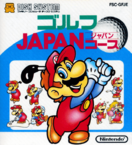 FDS |
Golf: Japan Course is a simple Japan-only update to the 1984 original Golf game, albeit with new holes, different types of grasses added, and trees acting as solid obstacles. Mario is now in his normal proportions and outfit, while a palette swap Luigi is available for the second player. There is also a palette-swapped computer opponent that wears black and brown.
Japan Course was involved in a major contest. After finishing all the holes, players had an option of saving their score. If the score was good, the score could be recorded into a special blue disk that came with the game and sent via Disk Fax to Nintendo in Kyoto. 5,000 runners-up received the Professional Course golden Disk Card, which is much harder than the original. The top 100 scorers received a plaque with their names on it, as well as a Champions' Course golden Disk Card with their name and rank programmed onto the title screen, and an even more difficult set of holes. |
| Golf: U.S. Course | |
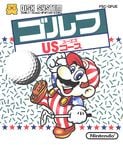 FDS |
Golf: U.S. Course was released months later and is also a Japan-exclusive game. It is more open, and a bird's-eye view of the holes is not available during gameplay, making it a bit more challenging. In this game, Mario wears a blue shirt and red-and-white striped overalls. Luigi is not mentioned in the game or the instruction manual, but the second player is a green palette swap, while Player 3 is blue and Player 4 is orange. There is also a hidden female playable character that can be unlocked.
The game also had a contest similar to Japan Course in which the main prize was a trophy and a golden Punch-Out!! Famicom cartridge. An unannounced prize was the golden disk Golf: Prize Card, which contained the harder Special Course. It was given out during the same contest but likely as part of a lottery to a thousand players whose submissions included a hole-in-one. |
| NES Open Tournament Golf | |
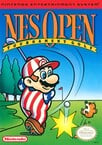 FC/NES |
NES Open Tournament Golf is a golf game released for the Nintendo Entertainment System. The game features Mario and Luigi as playable characters along with Princess Toadstool and Princess Daisy as their caddies. Additionally, various other humans made their appearance, including Steve (beginner), Mark (amateur), Tony (semi-professional), and Billy (professional). Despite using Super Mario branding, the game gives Mario title billing in the Japanese release only. In the American version, the graphics differ slightly, and the soundtrack has been changed.
A version of this game was made for the Nintendo PlayChoice-10 in America, called Mario's Open Golf. It was rereleased for Wii, Nintendo 3DS, and Wii U through Virtual Console, and Nintendo Switch through Nintendo Entertainment System - Nintendo Switch Online. It was also included in Nintendo Classic Mini: Family Computer, released only in Japan. |
| Mario Golf (Nintendo 64) | |
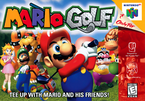 Nintendo 64 |
Mario Golf, for Nintendo 64, is a 3D golfing simulator featuring the standard cast of Super Mario characters along with a new cast of human characters exclusive to the game. Players could choose to play through tournaments and special challenges in the single player mode. The ordinary basics of the multiplayer side of the game were the strokes and match play modes, with special modes including a mini-putt mode (called "Putt-Putt") and a practice mode.
It was rereleased for Wii initially in 2008 and for Wii U in 2015 through Virtual Console, and for Nintendo 64 - Nintendo Switch Online in 2022. |
| Mario Golf (Game Boy Color) | |
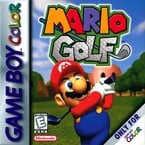 Game Boy Color |
Mario Golf, for the Game Boy Color, was released shortly after the home console game. This version has a very different premise apart from its Nintendo 64 counterpart with much of the single player mode played like an RPG, where players can choose one of four characters and conquer the challenges of the golf world. The game also features a multiplayer mode and special free-play modes for players interested solely in the golfing portion of the game and those who had finished or wanted a break from the main quest.
The portable game could link up to the Nintendo 64 version via the use of that console's Transfer Pak, and characters trained in the Game Boy Color version could then be played in the Nintendo 64 version like any other character. It was rereleased for Nintendo 3DS through Virtual Console, initially in 2012, and for Game Boy - Nintendo Switch Online in 2024. |
| Mario Golf: Toadstool Tour | |
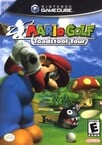 Nintendo GameCube |
Mario Golf: Toadstool Tour was the next entry in the series, released for the Nintendo GameCube. The game takes the basic formula of the N64 version with some minor revisions made. The main appeals of this entry were the highly updated graphics and improved swing system. New guides on the interface showed players exactly how much power they needed to land the ball exactly where they wanted it. Players still need to factor in the wind, the ball lie, and deal with their slicing or drawing the ball.
New playable characters added in this installment include Daisy, Koopa Troopa, Diddy Kong, Waluigi, Birdo, Bowser Jr., Boo, Shadow Mario, and Petey Piranha. |
| Mario Golf: Advance Tour | |
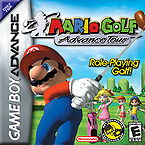 Game Boy Advance |
Mario Golf: Advance Tour is another title for the series, it was released for the Game Boy Advance, and is the handheld counterpart to Mario Golf: Toadstool Tour. While the gameplay is identical to that its home console counterpart, as well as the game's new visuals impressed with pre-rendered sprites and Mode 7 scaling for the golf courses, the content is very similar to that of its handheld predecessor, continuing the RPG-style. The main story follows two fledgling golfers named Neil and Ella in their quest to become world-class golfers.
This game can be linked to its home console counterpart via the Nintendo GameCube - Game Boy Advance cable as can be use to unlock new features such as Neil and Ella, after being trained up, could be transferred onto Toadstool Tour as playable characters, where they also gain their own custom taunts and support messages like the other playable characters. Additionally, star versions of various courses and new characters can be unlock in the game based on the number of Best Badges earned from Toadstool Tour. It was rereleased for Wii U through Virtual Console in 2014. |
| Mario Golf: World Tour | |
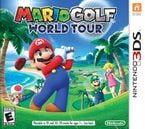 Nintendo 3DS |
Mario Golf: World Tour is a title released for the Nintendo 3DS. It introduces a number of new features into the series, including gyroscope support, online multiplayer, Item Shots, and downloadable content. Like Mario Tennis Open, it feature Miis as playable characters (a first for the Mario Golf series) and unlockable outfits for them. The game also includes Castle Club, a story mode where the player's Mii can compete in different tournaments.
Beside Miis, new playable characters to the series introduced in this installment include Toad, Kamek, and Koopa Paratroopa as unlockable characters, as well as Gold Mario, Toadette, Nabbit, and Rosalina as characters available through add-on content. |
| Mario Golf: Super Rush | |
 June 25, 2021 Nintendo Switch |
Mario Golf: Super Rush was released for the Nintendo Switch. The game includes many new features and several modes, as well as a reimagined version of Speed Golf, where players must travel across the courses to physically run to their ball in-between shots under time pressure. A Story Mode, called Golf Adventure, is also included, where the player's Mii can go through a variety of unique challenges and level up on their stats. Motion or button controls can be used to play either way.
New playable characters added in this installment include Pauline, Chargin' Chuck, and King Bob-omb, as well as Ninji, Wiggler, and Shy Guy post-launch. |
Predecessors[edit]
| Title | |
|---|---|
| Cover, original release, and system | Synopsis |
| Golf | |
 FC/NES |
Nintendo's original golf game, programmed by Satoru Iwata, is a simple game of 18 holes. Along with its original releases as a launch title on the Family Computer and Nintendo Entertainment System, it has been ported numerous times, including the Family Computer Disk System, numerous Japanese personal computers, and the Nintendo PlayChoice-10. The character in it resembles a more realistic portrayal of Mario, wearing white and blue as Player 1 and red and black as Player 2, though he is sometimes identified as Mario and other times as a generic character nicknamed "Ossan." Unlike in most later games in the series, the holes lack any distinction between rough grass and fairway, while trees solely act as out-of-bounds areas. |
| Stroke & Match Golf | |
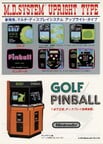 VS. System |
Stroke & Match Golf or VS. Golf is a variation of the original game on the VS. System series of arcade machines. It was released alongside VS. Pinball. Three versions were released, all with a randomly picked selection of 18 holes from a larger sample, which differs between each release. The sole Japanese version and one of the two overseas versions feature Mario with the same sprites as the original game, but the other overseas version features a female golfer instead. Since the game is an arcade game, a credit system is implemented, but how it works varies by region. |
| Golf (Game Boy) | |
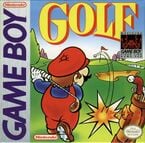 Game Boy |
Despite sharing a title with the original game, the Game Boy Golf has 36 holes spread across a Japan Course and a U.S.A. Course, similar to the previous separate Disk System games, which it is also otherwise more similar to. Unlike in the previous games, there is no "back view" of Mario, instead showing a heavily zoomed-in version of the bird's-eye map. Multiplayer requires two Game Boys and a link cable. |
Related[edit]
| Title | |
|---|---|
| Cover, original release, and system | Synopsis |
| Golf* | |
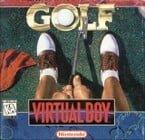 Virtual Boy |
This game was initially developed by T&E Soft and released in Japan as the unrelated T&E Virtual Golf, though it was localized as simply Golf* or as Nintendo Golf, giving it a connection to the earlier games. It features a generic human golfer (implicitly named "Duff" by the default name registry) in place of Mario and, due to the Virtual Boy's capabilities, has a course of 18 fully 3D holes with hills and slopes at the Papillion Golf & Country Club. Due to the different development history, it has several gameplay differences from the other games, though some of its mechanics are used in Mario Golf for the Nintendo 64. |
| Mobile Golf | |
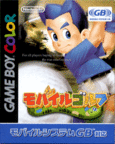 Game Boy Color |
This Japan-only game is a spinoff of Mario Golf for the Game Boy Color and is very similar to its predecessor. Its main innovation was multiplayer games within a mobile phone network via a special adapter. Unlike in its predecessor, the holes are based on real locations, like in the earlier Golf games. |
| Mario Sports Superstars | |
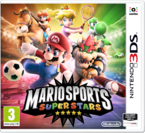 Nintendo 3DS |
A Nintendo 3DS game that was released in March 2017. Golf, developed by Camelot like the main series, is included as one of the five sports available. Metal Mario returns after being playable once in the Nintendo 64 version of Mario Golf, and Baby Luigi and Pink Gold Peach, both characters that have yet to be playable in the main Mario Golf series, are playable characters in this game. |
Playable characters[edit]
In the nine installments of the Mario Golf series, many Super Mario characters appear. Human characters unique to the Mario Golf series, such as Kid, appear in dark cells.
| Golfer | Golf | Japan Course | US Course | NES Open | N64 | GBC | Mobile | Toadstool Tour | Advance Tour | World Tour | Superstars | Super Rush |
|---|---|---|---|---|---|---|---|---|---|---|---|---|
| Mario | ||||||||||||
| Luigi | ||||||||||||
| Lady golfer | ||||||||||||
| Peach | ||||||||||||
| Bowser | ||||||||||||
| Baby Mario | ||||||||||||
| Yoshi | ||||||||||||
| Wario | ||||||||||||
| Donkey Kong | ||||||||||||
| Metal Mario | ||||||||||||
| Plum | ||||||||||||
| Charlie | ||||||||||||
| Sonny | ||||||||||||
| Harry | ||||||||||||
| Maple | ||||||||||||
| Kid | ||||||||||||
| Sherry | ||||||||||||
| Joe | ||||||||||||
| Azalea | ||||||||||||
| Putts | ||||||||||||
| Grace | ||||||||||||
| Tiny | ||||||||||||
| Gene Yuss | ||||||||||||
| Foreman Spike | ||||||||||||
| Ken | ||||||||||||
| Napple | ||||||||||||
| Thread | ||||||||||||
| Lisa | ||||||||||||
| Bean | ||||||||||||
| Rozary | ||||||||||||
| Powert | ||||||||||||
| Bird | ||||||||||||
| Daisy | ||||||||||||
| Koopa Troopa | ||||||||||||
| Diddy Kong | ||||||||||||
| Waluigi | ||||||||||||
| Birdo | ||||||||||||
| Bowser Jr. | ||||||||||||
| Boo | ||||||||||||
| Shadow Mario | ||||||||||||
| Petey Piranha | ||||||||||||
| Neil | ||||||||||||
| Ella | ||||||||||||
| Toad | ||||||||||||
| Kamek | ||||||||||||
| Paratroopa | ||||||||||||
| Gold Mario | ||||||||||||
| Toadette | ||||||||||||
| Nabbit | ||||||||||||
| Rosalina | ||||||||||||
| Mii | ||||||||||||
| Baby Luigi | ||||||||||||
| Pink Gold Peach | ||||||||||||
| Pauline | ||||||||||||
| Chargin' Chuck | ||||||||||||
| King Bob-omb | ||||||||||||
| Ninji | ||||||||||||
| Wiggler | ||||||||||||
| Shy Guy | ||||||||||||
| Unique characters introduced | 1 | 1 | 0 | 0 | 16 | 4 | 8 + 1 DLC = 9 | 11 | 0 | 4 + 4 DLC = 8 | 2 | 3 + 3 DLC = 6 |
| Total playable characters | 1 | 2 | 2 | 2 | 18 | 11 | 12 + 4 DLC = 16 | 18 | 18 | 17 + 4 DLC = 21 | 18 | 17 + 5 DLC = 22 |
1 - The character is unlockable, but available by default in multiplayer.
2 - The character is unlockable.
3 - The character is available as paid DLC.
4 - The character was added through a free update.
5 - The character is only playable in Story Mode.
6 - The character is unlocked by transfering from partner version
7 - The character is unlockable through Mobile Adapter GB DLC
8 - The character is unlockable in the Prize Card version or with a disk registered with the Disk Fax service.
Game modes[edit]
It has been requested that this section be rewritten and expanded to include more information. Reason: include more game modes
Speed Golf[edit]
- “Finish faster than anyone else. The faster play time wins!”
- —Introduction, Mario Golf (Nintendo 64)
Speed Golf is a recurring game mode that has appeared in nearly every main installment of the Mario Golf series. The game mode's rules throughout the series are to complete a course (or a three-, six-, or nine-hole section of it) as fast as possible, and the player is timed through each hole on how long the player has spent on each one. It can usually be played against a CPU or alone, and any course can be chosen. In Mario Golf: Super Rush, players must run to the balls in order to hit them until they enter the hole.
Gallery[edit]
Names in other languages[edit]
| Language | Name | Meaning | Notes |
|---|---|---|---|
| Japanese | マリオゴルフ[?] Mario Gorufu |
Mario Golf | |
| Chinese (simplified) | 马力欧高尔夫[1] Mǎlì'ōu Gāo'ěrfū |
Mario Golf | |
| Chinese (traditional) | 瑪利歐高爾夫[2] Mǎlì'ōu Gāo'ěrfū |
Mario Golf | |
| Korean | 마리오 골프[?] Mario Golpeu |
Mario Golf |
Trivia[edit]
- A golf course appears in the background of the Mushroom Kingdom stage of the Adventure Mode of Super Smash Bros. Melee, as a reference to the Mario Golf series. The Mario Golf series is also mentioned in Luigi's Diary in Paper Mario.
- Mario Golf is referenced in the Death Note manga, when Ryuk asks Light Yagami if he wants to play Mario Golf.
- In Nintendo Monopoly, there is a Coin Block/Brick Block card that rewards the player with $100 for winning a golf tournament.
- This series defies many common trends regarding the stats that Super Mario characters tend to have. For example, Mario, a balanced character in almost every game, has one of the longest drives in every Mario Golf game, while his brother Luigi, who is also often balanced, is a weak driver but has good control over the ball. Wario, typically a power character, is a middle-class driver in this series. Princess Daisy, usually a technique or balanced character, is a power-hitter similar to Mario.
- Rabbid Peach's Sandbagger Sentry in Mario + Rabbids Kingdom Battle references the Mario Golf games, as its description alludes to the golf club on the front of the weapon possibly belonging to Mario.
References[edit]
- ^ February 18, 2021. Nintendo Switch专用游戏软件最新资讯公开! 多款支持中文作品预定发售!. Nintendo of HK (Simplified Chinese). Retrieved February 18, 2021.
- ^ February 18, 2021. Nintendo Switch專用遊戲軟體最新資訊公開! 多款支援中文作品預定發售!. Nintendo of HK (Traditional Chinese). Retrieved February 18, 2021.
